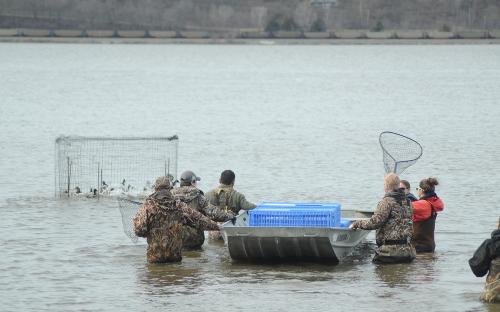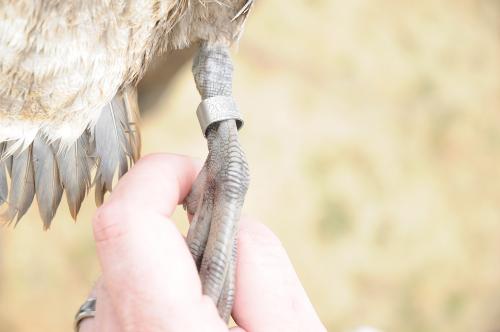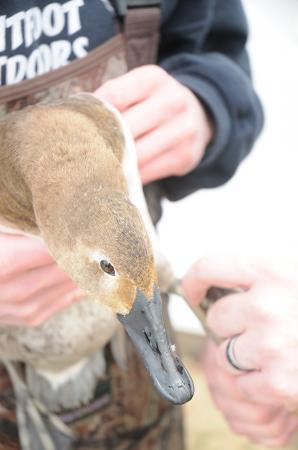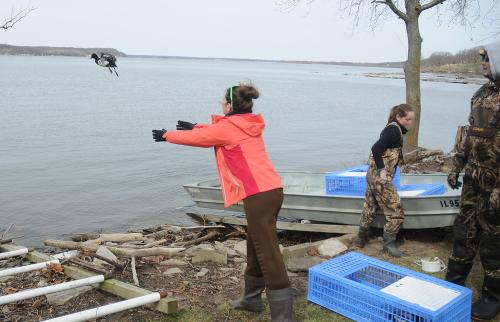University News
WIU Receives State Grant for Further Study of Waterfowl, Mississippi River Ecology
September 26, 2018
MACOMB, IL – The opportunity for Western Illinois University biological sciences students to conduct research on the Mississippi River, and study waterfowl that traditionally use the area, has been enhanced by a $300,000 grant from the Illinois Department of Natural Resources (IDNR).
The two-year grant was awarded to Associate Professor Chris Jacques of WIU's Department of Biological Sciences. It will allow for the study of waterfowl on navigational pools 13 and 19 of the Mississippi River and of "sublethal infections of trematode parasites" in captive lesser scaup (LESC), a species of diving duck. Pool 13 is located between Bellevue and Clinton, IA, and pool 19 is located near Nauvoo, IL.
"We've allocated funding to support eight research technicians, who will be working closely with our graduate research assistants and external collaborators (i.e., Illinois Department of Natural Resources, U.S. Geological Survey, U.S. Fish and Wildlife Service, Illinois Natural History Survey - Forbes Biological Station) to address priority LESC management and conservation issues," said Jacques. "Volunteer and paid research opportunities at WIU will play a critical role in collecting data to assess the impacts of seasonal LESC die-off events due to infection with trematode parasites and potential effects of changing environmental factors on habitat quality across critical mid-latitude stopover sites of LESC during spring and fall migration. Current and future WIU researchers are in a unique position to help contribute knowledge to help guide future wetland and waterfowl habitat restoration across the Upper Mississippi River System at state and regional levels."
A decline in the number of breeding population of lesser scaup over the last 30-40 years has been studied extensively in terms of factors, such as food availability and water quality, but there has been less research into disease-related factors. Lesser scaup become infected with trematode parasites by feeding on exotic faucet snails.
Lesser scaup visit the Mississippi River in Hancock County during spring and fall migration. WIU and its Kibbe Life Science Station in Warsaw, IL, are part of a larger project to study the migration and health of ducks, which is headed by Jacques.
The hope is that the work conducted by WIU faculty and students will aid in wetland habitat restoration and conservation planning in conjunction with the efforts of numerous river conservation groups. The purpose of the study is to look at the physiological response of the lesser scaup to two specific parasites in relation to how their bodies use the food they ingest. A sample population of female LESC will be held at Forbes Biological Station for experimental trematode infection trials. Some of the birds will be treated with medication so the stress of the infection by the two specific trematode parasites also will be studied as part of the research.
The grant will also help with research on the habitat quality of the Mississippi River pools the ducks use for seasonal migration. Assessing changes in navigational pool dynamics in relation to environmental factors (for example, sedimentation, light transparency, water chemical and physical characteristics, water depth, flood duration/timing and flow rates) may assist the IDNR and other state and federal agencies with the geographic prioritization of LESC conservation efforts.
WIU faculty and staff will be joined in the project by researchers from the Illinois Natural History Survey, the United States Geological Survey, the United States Fish and Wildlife Service, the University of Illinois at Urbana-Champaign and the IDNR.
For more information about the WIU Department of Biological Sciences, visit wiu.edu/biology.
Posted By: Jodi Pospeschil (JK-Pospeschil@wiu.edu)
Office of University Communications & Marketing





Connect with us: